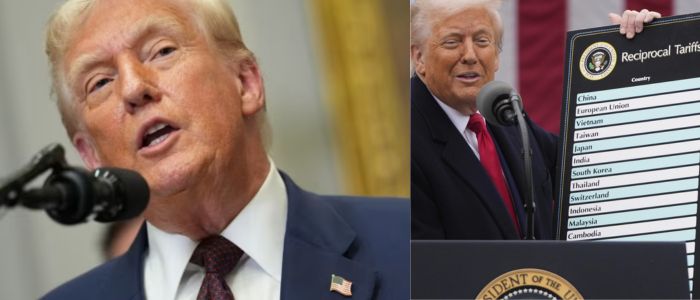The tariffs took effect at 12:01 a.m. Washington time, which was 1201 hours "tomorrow" in Tokyo – just before the deadline set by President Donald Trump for China to accept his demands for sweeping changes to its policies on intellectual property, technology transfers, and industrial subsidies.
The rates which fluctuate widely, from just 10% on UK exports to a hefty 41% on goods from Syria — come in addition to existing import duties.
Trump said the action would add billions of dollars to the US economy, declaring online that "only a Radical left Court" could prevent what he described as "America's greatness."
His remarks alluded to a case currently before an appeals court that is challenging his ability to levy such tariffs on his own.
Global Repercussions and Reactions
The surprise tariffs had sparked a scramble by other countries around the world to respond with fresh measures of their own. A few — such as Switzerland, India, and Brazil — have been assessed even greater overall rates due to executive orders targeted at political problems.
That would bring Brazil up to 50% and India could face the same unless it backtracks on buying oil from Russia in response to US sanctions within 21 days.
The Swiss president, Karin Keller-Sutter, flew to Washington earlier this week for emergency talks in order to turn around what appeared to be a gratuitous 39 percent tariff imposed on the Swiss.
An emergency meeting of the Swiss federal government is being held after her reintroduction.
Trump first unveiled his tariff list in April and has since revised it, reshuffling global trade relations.
The European Union has the distinction of working out a list through a framework, which is resulting in some tariff reduction on EU wine (relocating from zero to 20%) and a 15% flat rate on other goods, such as cheese.
Ongoing Negotiations and Threats
While some countries have secured lower rates or deferment. They arrived at agreements in the nick of time — as did the UK, Japan, South Korea, Vietnam, Thailand, and Cambodia.
Mexico got a reprieve from its current 25% rate, as did Canada, which also saw the tariff for lumber jump to 35% effective last Friday.
China, meanwhile, which remains under negotiation, will be offered a 30% tariff rate until it faces its own August 12 deadline.
In a further escalation, Trump on Wednesday threatened to slap a 100% tariff on semiconductor chips from nations that do not make the product in America or finance production.
Uncertainty Ahead
Trump has said the moves are part of a larger strategy to put an end to what he says are decades of unfair trade practices that have eroded the wealth and confidence of US companies and workers.
Calling 2 April — when the tariffs were first announced — "liberation day," he says they will restore a balance to world trade.
Yet critics say the tariffs risk pushing up prices, angering allies, and discouraging foreign investment. The decisions put governments in a tough spot; either to appeal, negotiate exceptions, or prepare for the economic damage of falling dominos throughout supply chains.
With the dust still settling, the world is responding to Trump´s deepening war on trade — one that is set to ensnare other countries in an expanding tariff battle.
World

Trump's New Tariffs Hit Dozens of Countries with Higher Export Taxes

Dozens of countries were hit by a geopolitical snowball on Thursday as a massive new wave of US tariffs officially took effect, increasing export taxes from the UK to India, Syria, and Brazil. The action, part of Donald Trump's "reciprocal" trade policy, has provoked a global outcry and emergency talks in multiple foreign capitals.















